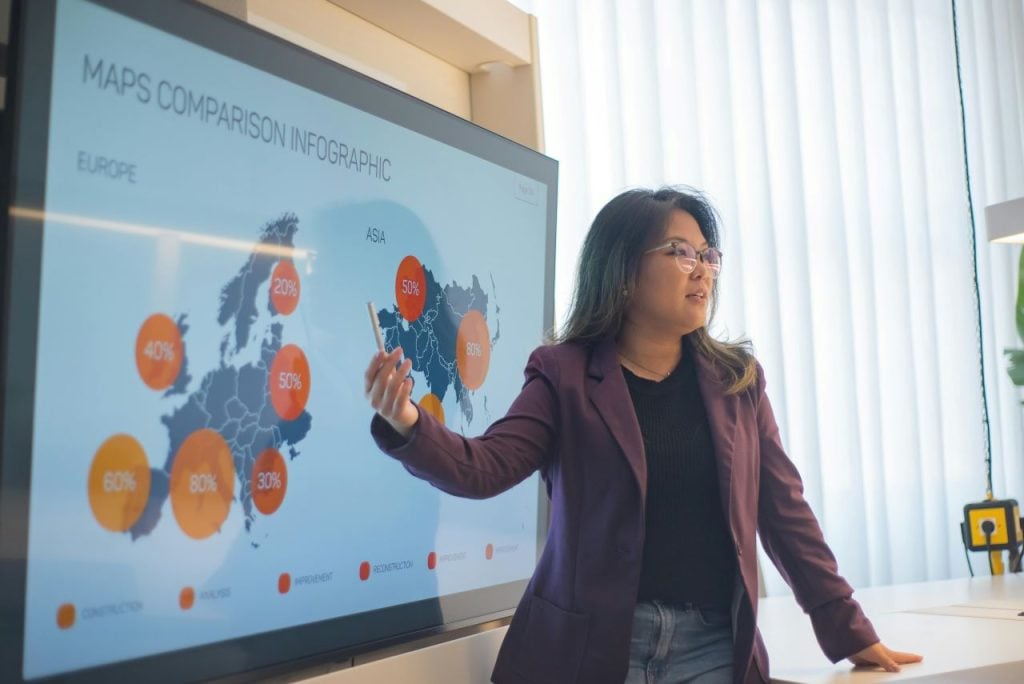Global Government Forum provides a wide range of live, interactive training courses which build on our ethos of providing high-quality events and information for civil servants from around the world. Our courses are listed below, or for bespoke training programmes visit our About our training page for more information. For more details on our trainers visit Trainer biographies. We provide training delivered both virtually and face-to-face.
Global Government Forum, as part of Pendragon International Media Ltd, have been named as a supplier on Crown Commercial Service’s (CCS) Learning & Training Services DPS Framework. All our Learning and Training services are included in the framework.
CCS supports the public sector to achieve maximum commercial value when procuring common goods and services.
To get real value out of data it needs to be presented in a compelling way to senior leaders, stakeholders, colleagues, and members of the public. This can be a challenging process, as it requires assessing the needs and data literacy of your audience, making critical selections about charts and other visual styles, and applying design skills to ensure the story stands out. This seminar will give you a repeatable framework for turning data insights into persuasive visual stories for slide decks, reports, dashboards and other formats. It will introduce simple and effective design techniques that can be applied using the software you already have access to.
This is a two-day training course taking place on Tuesday 22nd and Wednesday 23rd July
A strategy is only as good as its implementation – the extent to which it actually delivers intended policy outcomes. This event provides an in-depth exploration of the key ingredients for implementing strategy and policy in the civil service or any public sector role. Starting with the foundations of strategy, the event explores a wide range of implementation issues including feasibility, capacity, project management and change management. The event is very interactive and will include insights from senior civil service leaders.
One of the most commonly identified group of problems facing civil service departments in terms of accessing, making effective use of, and sharing data and information, are the issues of data quality, data storage, legacy records and the lack of interoperability that this causes. Having in place proper records management processes and procedures is key to tackling this problem and to enabling organisations to make effective use of the vast amounts of untapped data they hold, including sharing data appropriately across departments and with other public sector organisations.
This course is designed to provide a comprehensive introduction to the subject of data governance and records management in the civil service and the wider public sector. It covers all the main knowledge you need, explains the terminology, examines what processes are involved, and explores the benefits of good data and records management for everyone working in the civil service, whatever your role or level.
There are a number of highly effective tools that can be used to improve the robustness of your policy planning and development. This event covers the essentials that every policy maker needs. It considers the design aspects of the policy cycle – rationale, objectives, and appraisal of options, including assessing the feasibility of implementation in the early stages of design.

The Covid-19 pandemic and the oil price shock emanating from the war in Ukraine are but two examples of crises that perpetuate the uncertain environment under which policymakers working in the civil service currently operate. Climate change and the impact of new technology such as AI are examples of long-term risks that similarly lead to uncertainty. However, most policymakers receive relatively little training or guidance on how to deal with this uncertainty in their everyday work. Inevitably, leaders and decision-makers have to make decisions on the basis of inadequate information and knowledge, often rapidly in real time.
This course will enable policymakers to better understand the decision-making process in the light of uncertainty including the role of emotions and psychology in decision-making; applying tools and frameworks that can help to strengthen decision-making in conditions of uncertainty; and making justifiable choices that can be explained to the public. We will also consider how to design public policy to make policy more resilient to crises, shocks and uncertainty in the first place. The aim of the course is to enable policymakers to step back and understand the bigger picture while understanding that uncertainty is to be embraced rather than feared.
This highly practical training seminar is designed to help you to develop your skills and confidence in writing briefings for senior officials and political decision-takers.
We will explore the policy context of briefing, examine a range of structures and templates for different type of briefs, and introduce a framework for writing policy briefs. The session will comprise a mix of guidance, discussion and practical exercises.
More highly motivated employees are likely to increase an organisation’s productivity levels. In the public sector, there may be less scope than elsewhere to provide substantial transactional rewards for performance. So how, in the civil service context, can we encourage people to give their best and increase the value to the public of what they deliver?
This highly interactive training seminar provides a wide range of insights into supporting the motivation and productivity of individuals and team-members. Productivity and efficiency are currently the focus of many governmental initiatives all around the world. Motivation is the key that is at the very heart of a productive, collaborative and high-performing team.
In practically whichever country you look at, women tend to be under-represented at the higher organisational levels. Many countries have legislation in place to address this issue, but even where discrimination and pay disparity are illegal, such bad practices often seem to continue with apparent impunity, often at alarmingly significant levels, despite the best intentions of the legislators. Other factors can also hold women back, ranging from external perceived expectations about leadership profiles, job roles, or a lack of opportunity, through to personal issues such as self-confidence and an absence of obvious career ladders for women to progress.
Global Government Forum are pleased to present two stand-alone, but complementary seminars that look into a wide range of issues affecting women who are either looking to move into leadership roles, or who are already in such roles, and who wish to equip themselves for a further upwards move.
In practically whichever country you look at, women tend to be under-represented at the higher organisational levels. Many countries have legislation in place to address this issue, but even where discrimination and pay disparity are illegal, such bad practices often seem to continue with apparent impunity, often at alarmingly significant levels, despite the best intentions of the legislators. Other factors can also hold women back, ranging from external perceived expectations about leadership profiles, job roles, or a lack of opportunity, through to personal issues such as self-confidence and an absence of obvious career ladders for women to progress.
Global Government Forum are pleased to present two stand-alone, but complementary seminars that look into a wide range of issues affecting women who are either looking to move into leadership roles, or who are already in such roles, and who wish to equip themselves for a further upwards move.
This 2 ½ hour training session on mastering prompt engineering will super-charge your ability to use AI at work.
You will be presented with different prompt frameworks and shown how to use them to best effect. We will examine practical techniques for writing stronger prompts, how to constantly refine and improve your prompt writing, including the best way to use AI itself to finesse your AI prompts. We shall also present platforms which give you access to multiple AI models, so that you can learn how to compare their output, and from there select the best models for you in whatever specific context you are currently using AI, so that you can operate even more effectively.



















